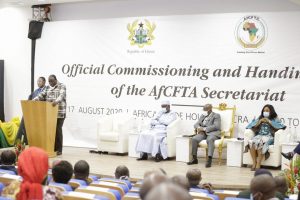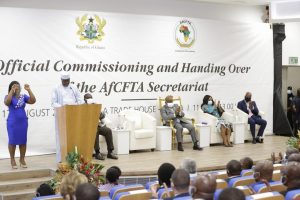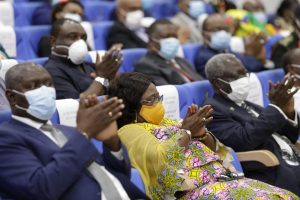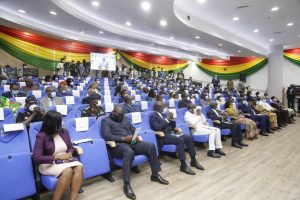AfCFTA Will Bring Many Benefits To Africa – Trade Minister
Ghana’s Minister of Trade and Industry, Alan Kyeremanten, has observed that the implementation of the AfCFTA will bring many benefits to Africa.
He was speaking at the commissioning and handing over of the AfCFTA Secretariat building in Accra on Monday August 17, 2020.
According to him, the implementation of AfCFTA will increase the level of intra African trade through better harmonization and coordination of trade within the African continent.
He noted that “it is estimated that intra African trade will increase by as much as 35 billion US dollars per annum or 52% by 2022.”
The Minister added that “secondly, it will address the challenge of small fragmented markets in Africa by creating a single continental market which will lead to economies of scale.”
” Thirdly, it will add value to Africa’s abundant natural resources and promote economic diversification and industrialization.”
” Fourthly, it will promote the development of regional value chains and facilitate cross border investments in Africa,” he noted.

” Fifth, it will open up market access opportunities for SMEs in Africa on preferential trade terms. Sixth, with a population of 1.2 billion, estimated to reach 2.5 billion by 2050, Africa will become a very attractive destination for Foreign Direct Investment because of its market size, with the potential for joint ventures and enhanced local content.”
” Seventh, it will deepen the integration of Africa into global markets through supply chain arrangements and other forms of subcontracting transactions. Eighth, Africa will improve its terms of Trade with the rest of the world by earning higher values for its exports through value addition.”
He indicated that “ninth, the AfCFTA will enhance benefits to consumers in Africa through lower prices of goods imported from within Africa. Tenth and last but not the least, it will significantly increase employment opportunities in Africa, particularly for the youth and other vulnerable groups.”

Whilst acknowledging the benefits to be gained from the AfCFTA, he said it is worth noting that these benefits will not accrue automatically to member States..
” It will require each Member State to develop a National Programme of Action in order to harness the benefits of the AfCFTA. Such programmes must be mainstreamed into national development strategies.”
“In addition, the effective implementation of the AfCFTA will require sustained political will and commitment from the highest level of executive authority in each country, in respect of providing adequate budgetary resources to support the growth and development of priority sectors, as well as creating the appropriate incentive and regulatory framework to attract investments from the private sector, both domestic and foreign.”

“At the national, regional and continental levels, the need to develop modern trade related infrastructure, including multi modal transport infrastructure to improve connectivity, cannot be overemphasized. There will also be the need to diversify our economies and produce more value added products. The challenges posed by non-tariff barriers and technical barriers to trade, including but not limited to standards, customs clearance processes and procedures and issues relating to rules of origin would all have to be addressed substantively,” he said.
‘Historic Day’
Minister of Foreign Affairs and Regional Integration, Shirley Ayorkor Botchwey, in her welcome remarks at the commissioning ceremony, observed that
“Today is historic as we witness the realisation of one of the aspirations of the founding fathers of the Organisation of the African Union, now the African Union.”
She reiterated that “at its formation in 1963, part of the agenda of the OAU, as reflected in the preamble of its Charter, was for African countries to explore their full potentials in order to develop greater capacity to negotiate better deals with the outside world.”

“To achieve this objective, the Lagos Plan of Action was adopted by the Heads of State of the OAU in 1980, setting forth the idea of a continental free trade area,” she said.
” That undertaking led directly to the Abuja Treaty establishing the African Economic Community in 1991. The journey to this point, for which we have gathered to celebrate, has indeed been long, rugged and arduous. Taking place even in the midst of the COVID-19 pandemic, today’s commissioning and handing over ceremony of the AfCFTA Secretariat is a reflection of our strong, collective resolve to push forward this African integration agenda. Undeniably, the negative effects of the COVID-19 pandemic on our economies and social lives makes this event even more imperative,” according to her.
“The Africa We Want has a shared framework for inclusive growth and sustainable development over the next 50 years. Agenda 2063 underscored the AfCFTA as one of the African Union’s flagship projects “to significantly accelerate growth of Intra-Africa trade and use trade more effectively as an engine of growth and sustainable development”.”
” Specifically, its goal is to double intra-Africa trade by 2022, by addressing persistent challenges comprehensively and resolutely.”

“This is the time for us to raise our ambitions even higher. This is not the time to sit back and watch. The Africa we desire and have worked for over the years is clearly visible on the horizon. This day ushers us onto the right stage to rapidly move towards achieving the other related flagship projects of Agenda 2063. We know that the road ahead will not be easy. It has not been easy all these decades, so we cannot expect any thing different. Our belief must be in ourselves and in our collective abilities as Africans. Together, we can and will build the Africa we want,” she said.

